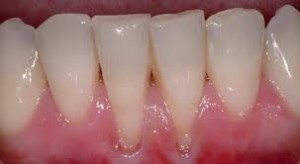
Gum recession is exposure of the roots of the teeth that occurs as either a loss of gum tissue or when the gum tissue retracts. Many of our patients have recession to some extent. So, if you have cold sensitivity or sensitivity during cleanings, be sure to discuss the possibility that you may have gum recession.
Recession commonly comes from clenching and grinding, brushing too hard, acid reflux or a history of wearing braces. Prevention of further recession may include treatment with a night guard, a change in your brushing technique or treating acid reflux. Unfortunately, once recession occurs, your gums will not “grow” back. So, in minor cases we simply do our best to ensure that it does not get worse. In severe cases, a referral to a gum specialist may be necessary.
Not all patients who have recession experience sensitivity. If you’re one of the lucky ones who is asymptomatic, it is still important to understand that there are risks. Because the root surface is so soft, you can actually start to scrub your roots away over time! Be cautious of heavy handed brushing. The roots are then also more susceptible to decay.
If sensitivity is an issue for you, there are some options! Using a sensitive toothpaste on a daily basis can help to seal up small tubules on your roots. An in-office treatment called a fluoride varnish can also be placed after your cleanings. This varnish protects and restores roots as well as seals them away from cold sensitivity. A varnish treatment twice a year can really decrease your sensitivity! If localized areas have been worn away, your dentist may recommend placing a small white filling in that area. This can also aid in reducing sensitivity and reduce your risk of decay reaching the nerve.
We measure and monitor your recession for you on a yearly basis, so it is important for you to see us for your cleaning and check ups. Together we will work hard at keeping your smile beautiful and pain free!
February 8, 2014
By now, most of society is aware that use of tobacco has many negative side effects, but have you considered its effects on your teeth and oral health? The most apparent side effect is dry mouth. Smoke inhalation causes salivary ducts and the tissue in your mouth to be dry and sticky. It can even change the consistency of your saliva! Lack of a little quality spit puts you at a higher risk for build up and decay.
It has also been shown that smoking is related to the failure of dental implants. Some oral surgeons may even recommend and patient try to quit smoking before implant placement in order to ensure the best results possible.
Smoking also causes vasoconstriction. This is the narrowing or shrinking of blood vessels which results in less blood flow to the tissues in your mouth such as your gums. A lack of blood flow means it is harder to get an inflammatory response in your gums. Think that it might not be so bad if your gums don’t get inflamed? Think again! Without inflammation, white blood cells cannot function to remove bacteria and control infections like periodontal infection. A healthy blood flow really does help aid in healing.
Using a smokeless tobacco? You’re at a much higher risk to develop oral cancer. If you’re not ready to quit, just be sure that you move your “chew” to a different place in your mouth each use. This will allow some time for your tissue to regenerate.
Quitting use of tobacco is a very personal decision. Be sure that when you decide to quit, you are the one deciding and that you’re ready for the commitment it takes. Your dental staff is trained to help you with this when you are ready!
January 29, 2014
Many people have mentioned lately that their employers are no longer providing dental insurance. With these comments in mind, we’d like to share a few things with you that may help as your start your search for privately purchased dental insurance.
Many companies offer insurance you can purchase directly rather than through an employer. When you call to discuss available benefits, it is important to weigh the cost of what you will pay for monthly coverage versus paying for care out of pocket. For instance, would your monthly payment cost more than your routine cleaning, exam and x-rays? Are you a higher risk patient needing fillings, crowns or other dental work? If you pay more for your benefits than you receive in services, consider paying out of pocket and receiving a discount for doing so instead. Our practice does offer a discount for those who pay out of pocket. Other important question to ask the insurance agent is if there are waiting periods on the plan. A waiting period is generally a 6 month to 1 year time in which you pay monthly for your benefits, but receive coverage only on cleanings, exams and x-rays until that waiting period is over. During this time frame, fillings, root canals or crowns may not be covered, yet your monthly payment remains the same.
Insurance can be confusing! So, call an insurance agent for options and details, then call our qualified front desk team to discuss any questions you may have. We are happy to help with anything that will keep you wearing a healthy smile!
January 12, 2014
 Did you know that many of you out there are not washing your hands adequately and don’t even know it? The most effective hand wash is done with warm or cold water and for a full 20 seconds. Be sure to focus on your finger tips and around your nail bed as these are great places for germs to hide. Rinse well and dry with paper towel. Use the towel to turn off the faucet in order to avoid touching a dirty handle.
Did you know that many of you out there are not washing your hands adequately and don’t even know it? The most effective hand wash is done with warm or cold water and for a full 20 seconds. Be sure to focus on your finger tips and around your nail bed as these are great places for germs to hide. Rinse well and dry with paper towel. Use the towel to turn off the faucet in order to avoid touching a dirty handle.
Good hand washing technique is an easy and important step to avoid falling sick with the cold or flu this season. Visit the Center for Disease Control website for more information: www.cdc.gov
January 6, 2014
Since we have been in practice for so many years, we have seen and heard it all! People using their teeth for things other than biting and chewing their food. Well, we are here to clear things up. Your teeth are not meant to be used as tools. They are meant to chew and look beautiful when you smile. Many people use their teeth to open packages, tear retail tags off of clothing, and we have even heard them being used to open soda cans. Yikes! These behaviors can lead to immediate and obvious broken or chipped teeth. They can unfortunately also cause the more silent problem of micro-fractures that may not become apparent for years.
So, before you decide to chew off the tag on that new sweater you just bought, consider the risk. A scissors will do a much better job and you can keep your flawless smile!
December 13, 2013
Did you know that our office has the ability to create custom whitening trays just for you? Most patients have stain on their teeth to some extent. Stain can come from use of coffee, tea, dark soda, red wine, tobacco or even some oral hygiene products. If you have some stain on your teeth, talk with us about it at your next visit. We can help!
Our custom whitening trays are made here in the office and it is a two-step process. We will take an impression of your teeth at your first visit. We create models and your custom trays and have you come back 1-2 weeks later to have them delivered. At this second visit, we check to make sure they fit correctly, and go over instructions and tips on how to use them at home. The rest is up to you! Your trays are worn at home until the desired whiteness is achieved. The best part? Your trays will fit for many years to come so you can ‘touch up’ your smile any time you need to!
December 4, 2013
The thought that “having a cavity will always cause some sensitivity or discomfort” is a very big, bad myth. Tooth decay will not generally cause symptoms until it is advanced enough to reach the nerve. Not treating decay in the early stages will lead to much more expensive procedures like root canal therapy. That’s why early detection through regular dental exams and x-rays is so important! We can detect these cavities before they advance into the nerve and repair them with more simple, less expensive treatments.
So, before you decide to wait until it hurts, think of what it may cost you in the end. Remember: once a cavity starts, it will only continue to grow
« Newer Posts —
Older Posts »



 Did you know that many of you out there are not washing your hands adequately and don’t even know it? The most effective hand wash is done with warm or cold water and for a full 20 seconds. Be sure to focus on your finger tips and around your nail bed as these are great places for germs to hide. Rinse well and dry with paper towel. Use the towel to turn off the faucet in order to avoid touching a dirty handle.
Did you know that many of you out there are not washing your hands adequately and don’t even know it? The most effective hand wash is done with warm or cold water and for a full 20 seconds. Be sure to focus on your finger tips and around your nail bed as these are great places for germs to hide. Rinse well and dry with paper towel. Use the towel to turn off the faucet in order to avoid touching a dirty handle.